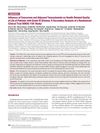 6 citations,
August 2022 in “International Journal of Molecular Sciences”
6 citations,
August 2022 in “International Journal of Molecular Sciences” EDA signaling is linked to skin disorders, various cancers, and liver disease.
5 citations,
May 2021 in “EMBO journal” Cell polarity signaling controls tissue mechanics and cell fate, with complex interactions and varying pathways across species.
91 citations,
July 2004 in “Journal of Biological Chemistry” Overexpressing SSAT enzyme reduces prostate tumor growth in mice.
[object Object]  October 2021 in “International journal of basic and clinical pharmacology”
October 2021 in “International journal of basic and clinical pharmacology” Excessive eyelash growth from erlotinib may indicate positive tumor response and help treat madarosis.
29 citations,
June 2015 in “Kidney International” Disrupting the Flcn gene in mice causes early kidney cysts and tumors, which can be treated with rapamycin.
 17 citations,
March 2012 in “The Journal of Pathology”
17 citations,
March 2012 in “The Journal of Pathology” In vivo lineage labelling is better than in vitro methods for identifying and understanding stem cells.
21 citations,
November 2021 in “Cells” Hedgehog pathway inhibitors can treat certain aggressive cancers but face limitations like resistance and side effects.
 July 2023 in “Stem Cells Translational Medicine”
July 2023 in “Stem Cells Translational Medicine” Mesenchymal Stem/Stromal Cells (MSCs) help in wound healing and tissue regeneration, but can also contribute to tumor growth. They show promise in treating chronic wounds and certain burns, but their full healing mechanisms and potential challenges need further exploration.
266 citations,
January 2016 in “Development” YAP and TAZ are crucial for skin cell growth and repair.
 49 citations,
February 2008 in “Stem Cells”
49 citations,
February 2008 in “Stem Cells” Wnt10b helps blood stem cells grow after injury.
 1 citations,
August 2023 in “The Journal of Pathology”
1 citations,
August 2023 in “The Journal of Pathology” Different types of skin fibroblasts have unique roles in skin health and disease.
[object Object]  November 1999 in “Australasian Journal of Dermatology”
November 1999 in “Australasian Journal of Dermatology” The document concludes that there is a need for more research and regulation in dermatology, covering topics like latex allergy in children, the use of botulinum toxin, and treatments for skin conditions.
 4 citations,
July 2021 in “Cancer Research and Treatment”
4 citations,
July 2021 in “Cancer Research and Treatment” Temozolomide improves survival in grade III glioma patients without harming quality of life.
 38 citations,
December 2009 in “Therapeutic Advances in Medical Oncology”
38 citations,
December 2009 in “Therapeutic Advances in Medical Oncology” The conclusion suggests that prostate cancer should be classified by castration status and that new therapies targeting androgen receptor signaling show promise.
 402 citations,
August 2011 in “Cancer research”
402 citations,
August 2011 in “Cancer research” Prostate cancer cells can make their own androgens to activate the androgen receptor, and treatments like abiraterone may increase this ability, suggesting new therapies should target the entire steroid-making pathway.
 124 citations,
February 2018 in “Nature Reviews Genetics”
124 citations,
February 2018 in “Nature Reviews Genetics” Stem cell plasticity is crucial for wound healing but can also contribute to cancer development.
 71 citations,
September 2007 in “Cancer”
71 citations,
September 2007 in “Cancer” Prostate cancer prevention includes diet changes, supplements, and medications, with more answers expected soon.
 3 citations,
November 2022 in “Frontiers in oncology”
3 citations,
November 2022 in “Frontiers in oncology” Low zinc levels may be linked to the return of gynecologic cancers.
 1 citations,
July 2014 in “International Journal of Dermatology”
1 citations,
July 2014 in “International Journal of Dermatology” A cancer patient developed a type of hair loss after starting a cancer drug called vandetanib.
 June 2023 in “Journal of multidisciplinary sciences”
June 2023 in “Journal of multidisciplinary sciences” PCOS may increase the risk of certain cancers.
 232 citations,
January 2013 in “Nature Cell Biology”
232 citations,
January 2013 in “Nature Cell Biology” Understanding where cancer cells come from helps create better prevention and treatment methods.
 113 citations,
July 2020 in “Communications biology”
113 citations,
July 2020 in “Communications biology” Men, especially older ones with health issues like prostate cancer, may have worse COVID-19 outcomes and could benefit from therapies targeting male hormones.
 68 citations,
April 2014 in “Journal of Molecular Endocrinology”
68 citations,
April 2014 in “Journal of Molecular Endocrinology” The document concludes that targeting the androgen receptor may be a promising breast cancer treatment, especially for certain types.
 56 citations,
February 2006 in “American journal of physiology. Cell physiology”
56 citations,
February 2006 in “American journal of physiology. Cell physiology” Steroid sex hormones activate matriptase in prostate cancer cells but not in breast cancer cells.
 20 citations,
May 2018 in “The Journal of Urology”
20 citations,
May 2018 in “The Journal of Urology” Men taking 5-alpha-reductase inhibitors before or after bladder cancer diagnosis had a lower risk of dying from the disease.
 17 citations,
January 2016 in “American Journal of Epidemiology”
17 citations,
January 2016 in “American Journal of Epidemiology” Men with male pattern baldness have a higher risk of dying from prostate cancer.
 9 citations,
January 2014 in “Medical Hypotheses”
9 citations,
January 2014 in “Medical Hypotheses” Higher DHT in male baldness may protect against prostate cancer.
 3 citations,
March 2018 in “BMC Cancer”
3 citations,
March 2018 in “BMC Cancer” Baldness, especially at the front, may lower the risk of testicular cancer by 31%, but its link to prostate cancer is unclear.
 November 2022 in “CARDIOMETRY”
November 2022 in “CARDIOMETRY” A group has developed therapies that show promise for treating cancer and various other conditions.
 April 2012 in “The Journal of Urology”
April 2012 in “The Journal of Urology” Eating more omega-3 and less omega-6 fatty acids may lower the risk of developing prostate cancer.

























